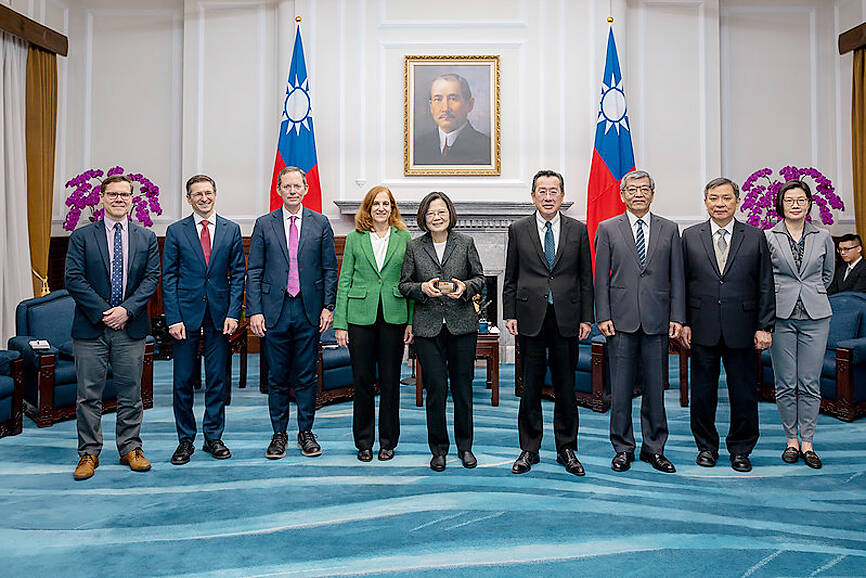President Tsai Ing-wen (蔡英文) yesterday urged like-minded nations to unite in safeguarding democracy and freedom, while calling for deeper ties with the US to contribute to regional prosperity.
Tsai made the remarks while welcoming a delegation of academics from Washington to the Presidential Office yesterday. They included German Marshall Fund Indo-Pacific Program managing director Bonnie Glaser, Eurasia Group China practice managing director Rick Waters, American Enterprise Institute senior fellow Zack Cooper and Freeman chair in China Studies at the US Center for Strategic and International Studies Jude Blanchette.
Tsai said that with the Taiwan Relations Act turning 45 next month, she looks forward to exchanging opinions on Taipei-Washington relations with the delegation.

Photo: Screen grab from the Presidential office’s Web site
The international situation has evolved since the act was passed in 1979, and the legislation has become an important cornerstone of maintaining peace and stability across the Taiwan Strait, she said.
Tsai thanked the delegation for continuing to monitor the situation in the Strait and publishing reports that help the international community better understand the crucial role Taiwan plays in the region.
As a responsible member of the international community, Taiwan has always been committed to maintaining peace and stability in the region, she said.
After the first agreement under the US-Taiwan Initiative on 21st-Century Trade was signed last year, it is hoped that Taipei and Washington would continue to bolster cooperation in the digital economy, emerging technology and telecommunications security, she said.
Tsai also asked the delegation to use their influence to help Taiwan and the US deepen their cooperation in various fields and jointly contribute to regional prosperity and development.
Glaser praised Tsai for her firm leadership over the past eight years, saying it has helped safeguard cross-strait peace and stability, Taiwan’s democracy and the freedom of Taiwanese.
In other news, CNN host Fareed Zakaria underlined the importance of dialogue between the US, Taiwan and China to avoid conflicts in the Strait in an op-ed published on CNN.com on Sunday.
In the article, titled “The world’s most dangerous place has only gotten more dangerous,” Zakaria attributed Taiwan’s situation to the expanding geopolitical rivalry between the US and China.
The attitudes of leaders in Washington and Beijing toward each other have gone “from benign, to wary, to hostile” in the past few years, he wrote, adding that Taiwan “sits at the heart of US-China relations.”
While Beijing sees unification with Taiwan as its historical mission, “Washington has been willing to accept China’s claims on Taiwan as long as it did not use coercion to achieve them,” he said.
The US’ stance, which is shared by many of its allies in Asia, is the “status quo” that most Taiwanese hope to maintain, he said.
As such, cross-strait issues “will need to be managed rather than solved,” he said.
“All three sides [the US, China and Taiwan] should keep talking to ensure there are no misperceptions or miscalculations,” he added.
Zakaria also warned about the consequences of mismanaged tensions, which could possibly lead to war — a “lose-lose-lose for all three parties” and the whole world.

Taiwan has received more than US$70 million in royalties as of the end of last year from developing the F-16V jet as countries worldwide purchase or upgrade to this popular model, government and military officials said on Saturday. Taiwan funded the development of the F-16V jet and ended up the sole investor as other countries withdrew from the program. Now the F-16V is increasingly popular and countries must pay Taiwan a percentage in royalties when they purchase new F-16V aircraft or upgrade older F-16 models. The next five years are expected to be the peak for these royalties, with Taiwan potentially earning

STAY IN YOUR LANE: As the US and Israel attack Iran, the ministry has warned China not to overstep by including Taiwanese citizens in its evacuation orders The Ministry of Foreign Affairs (MOFA) yesterday rebuked a statement by China’s embassy in Israel that it would evacuate Taiwanese holders of Chinese travel documents from Israel amid the latter’s escalating conflict with Iran. Tensions have risen across the Middle East in the wake of US and Israeli airstrikes on Iran beginning Saturday. China subsequently issued an evacuation notice for its citizens. In a news release, the Chinese embassy in Israel said holders of “Taiwan compatriot permits (台胞證)” issued to Taiwanese nationals by Chinese authorities for travel to China — could register for evacuation to Egypt. In Taipei, the ministry yesterday said Taiwan

Taiwan is awaiting official notification from the US regarding the status of the Agreement on Reciprocal Trade (ART) after the US Supreme Court ruled US President Donald Trump's global tariffs unconstitutional. Speaking to reporters before a legislative hearing today, Premier Cho Jung-tai (卓榮泰) said that Taiwan's negotiation team remains focused on ensuring that the bilateral trade deal remains intact despite the legal challenge to Trump's tariff policy. "The US has pledged to notify its trade partners once the subsequent administrative and legal processes are finalized, and that certainly includes Taiwan," Cho said when asked about opposition parties’ doubts that the ART was

If China chose to invade Taiwan tomorrow, it would only have to sever three undersea fiber-optic cable clusters to cause a data blackout, Jason Hsu (許毓仁), a senior fellow at the Hudson Institute and former Chinese Nationalist Party (KMT) legislator, told a US security panel yesterday. In a Taiwan contingency, cable disruption would be one of the earliest preinvasion actions and the signal that escalation had begun, he said, adding that Taiwan’s current cable repair capabilities are insufficient. The US-China Economic and Security Review Commission (USCC) yesterday held a hearing on US-China Competition Under the Sea, with Hsu speaking on